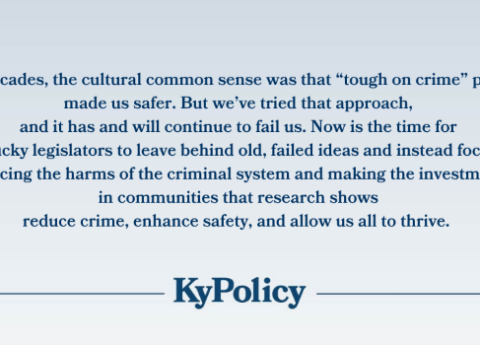In Kentucky, we use unaffordable cash bail to lock up too many people while they are awaiting trial, and it’s worse in some communities and for some people than others.
Data from the Administrative Office of the Courts shows that courts’ use of cash bail instead of non-monetary conditions for release – and the ability of people who are arrested to pay it – differs substantially between counties. For instance, the share of defendants released pretrial without monetary conditions ranges from just 5% in McCracken County to 68% in Martin County. And just 17% of defendants subject to monetary bail in Wolfe County find a way to make the payment while 99% do in Hopkins County.
Because people with low incomes struggle to pay bail – and because historic, structural barriers have resulted in disproportionately low incomes for people of color – they, their families and communities bear the brunt of the consequences of our unreformed pretrial system. In addition to income-related barriers to pretrial release, research also shows that people of color are often treated more harshly than white people during the pretrial release decision-making process.
Kentuckians presumed innocent should not have their freedom contingent on their income, where in the state they are arrested or the color of their skin, and yet that’s exactly what our system does.
The negative impacts on individuals and their families are clear. When bail is set so high that people cannot afford to be released from jail before their trial, they lose income and employment. Studies show they are more likely to be found guilty in trial, receive harsh sentences and to plead guilty even when they are innocent.
The costs to entire communities are also important: Incarcerating so many people pretrial places limitations on our labor force in the short and long term, and it is expensive to house defendants in our increasingly overcrowded local jails (the state does not pay for incarceration until after someone has been found guilty and sentenced). In addition, research shows pretrial incarceration is associated with an increased likelihood of criminal activity in the future.
Furthermore, as communities across the commonwealth struggle with addiction and individuals are arrested on non-violent, low-level drug charges or for related theft, few jails are equipped to provide treatment for substance use disorders, pretrial or otherwise.
Most Kentuckians who are released pretrial show up for court, and few are re-arrested for new crimes during the pretrial period. Data shows that other states with higher pretrial release rates do not suffer from greater flight or pre-trial crime. In other words, the evidence supports that we can safely reduce incarceration in Kentucky through bail reform.
It’s time for Kentucky to move away from its heavy reliance on, and unfair application of, money bail. In the 2020 legislative session, we need a strong bill that will lead to fewer people being incarcerated pretrial, including because they can’t afford bail.
Instead of exaggerating the risks of locking up fewer people still presumed innocent, we must acknowledge the much greater costs of continuing on our current path, and pay attention to what the evidence and the research about pretrial incarceration actually shows.
You can read more about this issue, and see county-level data, in my recent report on disparate justice in the commonwealth from the Kentucky Center for Economic Policy.



